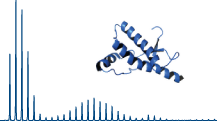
|
Ghaemmaghami Lab Department of Biology University of Rochester |

|

|
Ghaemmaghami Lab Department of Biology University of Rochester |

|
Current Projects
Global analysis of proteome homeostasis

A central focus of the lab is the development of novel mass spectrometry-based methodologies for system-wide analyses of protein homeostasis. Specifically, we are developing novel techniques for measuring the kinetics of protein degradation, folding, stability and oxidation on proteome-wide scales. These projects are being conducted in collaboration with the University of Rochester Mass Spectrometry Resource Laboratory.
Selected Recent Publications:
"Proteome birthdating reveals age-selectivity of protein ubiquitination." Mol Cell Proteomics 2024
"Global analysis of methionine oxidation provides a census of folding stabilities for the human proteome." Proc Natl Acad Sci 2019
Co-translational protein folding

Natural proteins are synthesized as linear polymers of amino acids and subsequently fold into distinct three-dimensional structures as they emerge from the ribosome. How interactions with the ribosome influence the folding of nascent proteins is an active area of research. We are developing mass spectrometry-based proteomic approaches for probing the folding of ribosome-bound nascent proteins during translation. The results are providing insights into how the ribosome facilitates accurate co-translational folding and modification of nascent proteins.
Selected Recent Publications:
"Folding stabilities of ribosome-bound nascent polypeptides probed by mass spectrometry." Proc Natl Acad Sci 2023
Methionine redox biology

Methionine residues are prone to oxidation and are converted to methionine sulfoxides by reacting with reactive oxygen species. Oxidized methionines can be enzymatically repaired through the action of a conserved class of enzymes known as methionine sulfoxide reductases (Msrs). Our laboratory is developing methods to investigate methionine redox on proteome-wide scales and identifying factors that regulate the oxidation and reduction of methionines.
Selected Recent Publications:
"Formylation facilitates the reduction of oxidized initiator methionines." Proc Natl Acad Sci 2024
"Protein folding stabilities are a major determinant of oxidation rates for buried methionine residues." J Biol Chem. 2022
"Quantitative analysis of in vivo methionine oxidation of the human proteome." J Proteome Res. 2020
Proteostasis and aging

We are using proteomics to investigate the relationship between protein quality control and aging. By conducting analyses of proteome degradation kinetics across multiple species, we have identified correlations between protein turnover rates and organismal lifespan. We are currently conducting experiments to investigate the link between protein turnover, protein damage and aging.
Selected Recent Publications:
"Accurate proteome-wide measurement of methionine oxidation in aging mouse brains." J Proteome Res. 2022
"Interspecies differences in proteome turnover kinetics are correlated with lifespans and energetic demands." Mol Cell Proteomics 2020
"Cross-species comparison of proteome turnover kinetics." Mol Cell Proteomics 2018